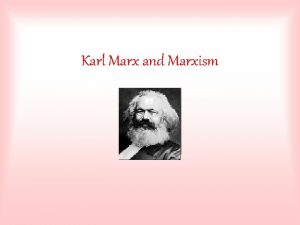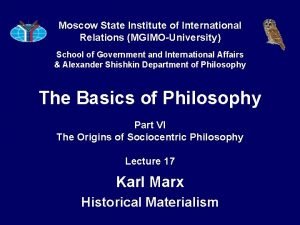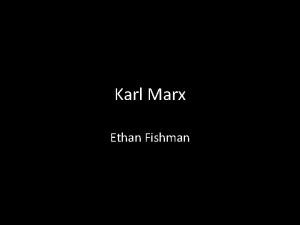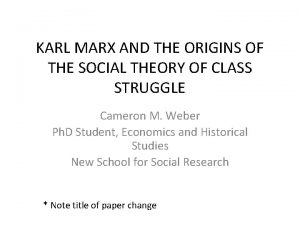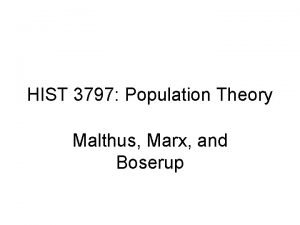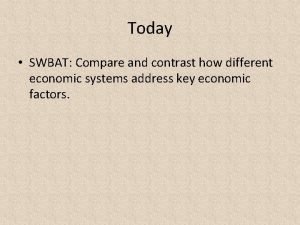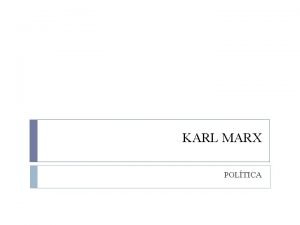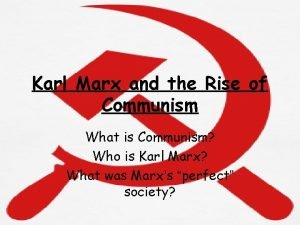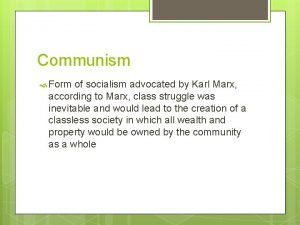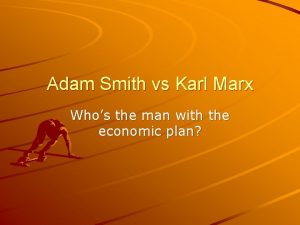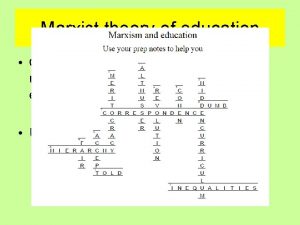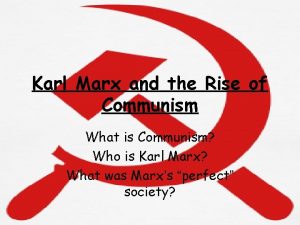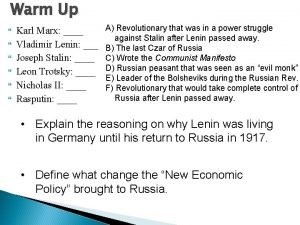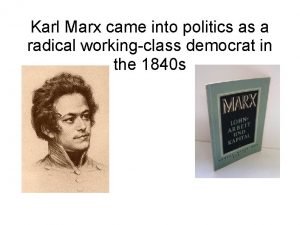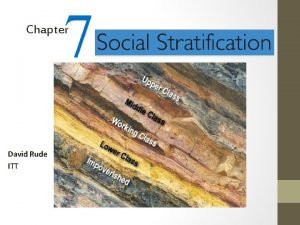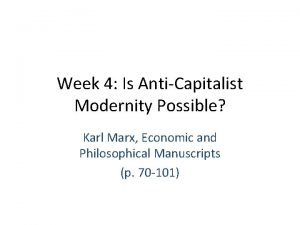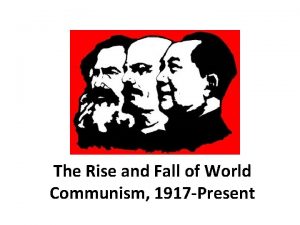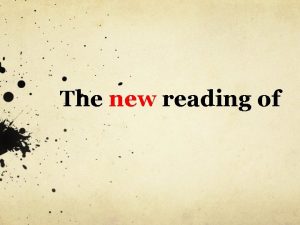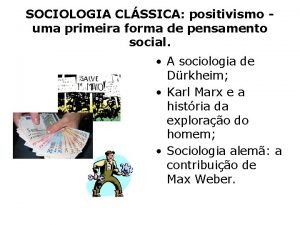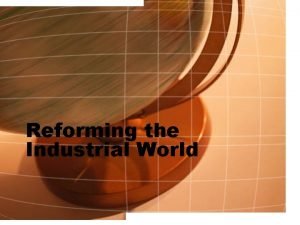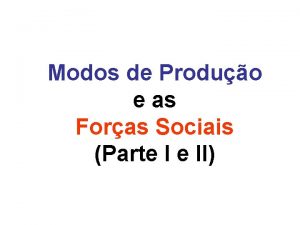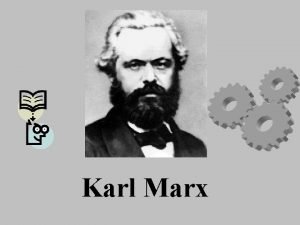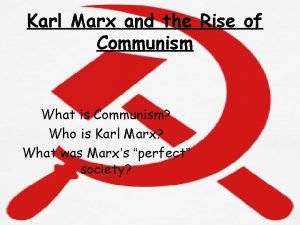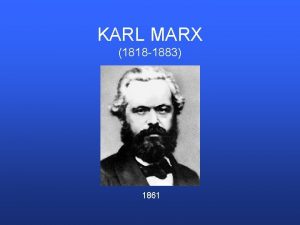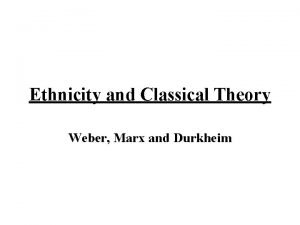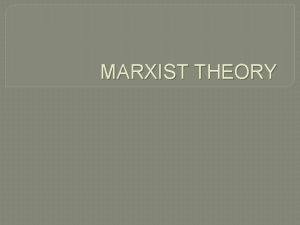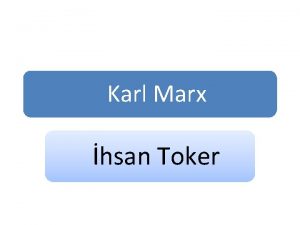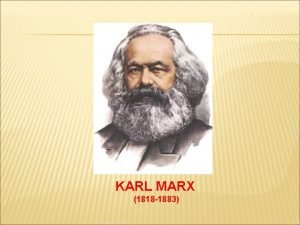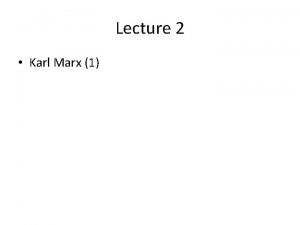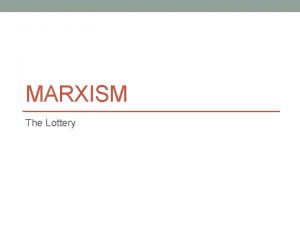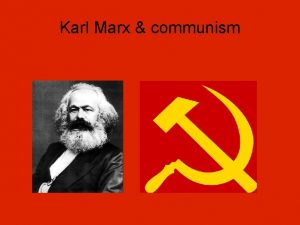History of Economic Thought Karl Marx 1818 1883












































- Slides: 44

History of Economic Thought Karl Marx (1818 – 1883)

Background – Influenced by – Contributions – Impact – Critique – Questions Karl Marx (1818 – 1883) 2/27/2021 2

Background – Influenced by – Contributions – Impact – Critique – Questions Karl Marx (1818 – 1883) • Born in Trier, Prussia • Now a days Germany • 19 th Century Philosopher, Scholar, Political Activist, Political Economist and a Revolutionary. • Often regarded as the Father of Communism. 2/27/2021 3

Background – Influenced by – Contributions – Impact – Critique – Questions Karl Marx (1818 – 1883) • Born into a Jewish family, that converted to Christianity to live a better life. • Third of seven children. • Home education till the age of 13. 2/27/2021 4

Background – Influenced by – Contributions – Impact – Critique – Questions Education • Interested in philosophy and literature. • Father pushed him to study something more practical. • At 17, a law student at the University of Bonn, Germany in 1835. • Never graduated. 2/27/2021 5

Background – Influenced by – Contributions – Impact – Critique – Questions Education • Interested in philosophy and literature. • Father pushed him to study something more practical. • At 17, a law student at the University of Bonn, Germany in 1835. • Never graduated. 2/27/2021 6

Background – Influenced by – Contributions – Impact – Critique – Questions Education • Transferred to University of Berlin. • At the University of Berlin in 1841 Marx earned Doctorate with a thesis titled “The Difference Between the Democritean and Epicurean” Philosophy of Nature. 2/27/2021 7

Background – Influenced by – Contributions – Impact – Critique – Questions Troublemaker • Enjoyed drinking during his early student period, spent a day in prison for disturbing the peace, vandalism, as well as fought in one dual in which he was wounded in his right eye. • Moved to Paris due to a stifling Prussian government. • At the insistence of the Prussian government, Marx was exiled from Paris in 1845, moving to Brussels until 1848. 2/27/2021 8

Background – Influenced by – Contributions – Impact – Critique – Questions Troublemaker • After publishing Manifesto of the Communist Party in 1848, he was again expelled, moving from Brussels back to Prussia. One year later he was exiled again, and returned to Paris. However, he was kicked out of France shortly thereafter, moving for the last time to London, where he would remain as a ‘stateless’ exile (illegal immigrant). 2/27/2021 9

Background – Influenced by – Contributions – Impact – Critique – Questions Wife • Jenny von Westphalen, an educated baroness of the Prussian ruling class who had known Marx since childhood 2/27/2021 10

Background – Influenced by – Contributions – Impact – Critique – Questions Friedrich Engels (1820 – 1895) • German social scientist and a philosopher, who developed communist theory “The Communist Manifesto” alongside his best known collaborator Karl Marx. 2/27/2021 11

Background – Influenced by – Contributions – Impact – Critique – Questions Immanuel Kant (1724, 1804) • German philosopher, believed to have had the greatest influence of any philosopher of modern times. • Kantian philosophy was the basis on which the structure of Marxism was built. 2/27/2021 12

Background – Influenced by – Contributions – Impact – Critique – Questions Georg Hegel (1770 – 1831) • German philosopher. • Followers divided into right wing and left wing circles. • Hegel claimed that reality should be viewed dialectically (By exchanging arguments and counter arguments to advocate proposition. ) 2/27/2021 13

Background – Influenced by – Contributions – Impact – Critique – Questions Ludwig Feuerbach (1804 – 1872) • German Philosopher and Anthropologist. • Known for critique of religion. • Advocated liberalism, atheism, and materialism. 2/27/2021 14

Background – Influenced by – Contributions – Impact – Critique – Questions Jean-Jacques Rousseau (1712 – 1778) • French Philosopher. • Attacked Institutions of private property. • Argued that the goal of government should be to secure freedom, equality, and justice for all within the state, regardless of the will of the majority. 2/27/2021 15

Background – Influenced by – Contributions – Impact – Critique – Questions Smith and Ricardo • Marx also studied Adam Smith and his book “the Wealth of Nation” and David Ricardo. • He was impressed by their writings. • Studied their labor theory of value. 2/27/2021 16

Background – Influenced by – Contributions – Impact – Critique – Questions Two types of Contributions • Positive – contributions to economic theory: 1. A theory of history, Evolution of Economic Regimes. 2. Theory of exploitation of workers. 3. Theory of business cycles. • Normative – as an activist for workers’ rights: 1. Communist manifesto. 2/27/2021 17

Background – Influenced by – Contributions – Impact – Critique – Questions 1. A theory of history, Evolution of Economic Regimes. • People falsely assume Marx wrote extensively on the subjects of Socialism and Communism. This however, is false. • He wrote mostly about Capitalism 2/27/2021 18

Background – Influenced by – Contributions – Impact – Critique – Questions 1. A theory of history, Evolution of Economic Regimes. Feudalism → Capitalism → Socialism → Communism Feudalism diagram: 2/27/2021 19

Background – Influenced by – Contributions – Impact – Critique – Questions 1. A theory of history, Evolution of Economic Regimes. Feudalism → Capitalism → Socialism → Communism Feudalism - A Medieval European political "system" comprised of a set of reciprocal legal and military obligations among the warrior nobility, revolving around the three key concepts of lords, vassals, and fiefs (land). For Marx, what defined Feudalism was that the power of the ruling class (the aristocracy) rested on their control of arable land, leading to a class society based upon the exploitation of the peasants who farm these lands, 2/27/2021 20 typically under serfdom.

Background – Influenced by – Contributions – Impact – Critique – Questions 1. A theory of history, Evolution of Economic Regimes. Capitalism: An economic system in which means of production are predominantly private owned and operated, and in which investments, distribution, income, production and pricing of goods and services are determined through the operation of a market economy. 2/27/2021 21

Background – Influenced by – Contributions – Impact – Critique – Questions 1. A theory of history, Evolution of Economic Regimes. Socialism: A socio-economic system in which property and the distribution of wealth are subject to control by the community. Communism: A socioeconomic structure that promotes the establishment of a classless society based on common ownership of the means of production. 2/27/2021 22

Background – Influenced by – Contributions – Impact – Critique – Questions 1. A theory of history, Evolution of Economic Regimes. • Marx argued that Capitalism will end through the organized actions of an international working class: "Communism is for us not a state of affairs which is to be established, an ideal to which reality will have to adjust itself. • Capitalism was basically unjust. It relied upon the exploitation of the workers. 2/27/2021 23

Background – Influenced by – Contributions – Impact – Critique – Questions 2. Theory of exploitation of workers • When big firms become bigger and even more powerful, they try to boost their profits by increasing the pressure on workers to, for example, work longer hours, work for lower wages, etc. • Argues that increases in productivity keep wages down. § How is that possible? 2/27/2021 24

Background – Influenced by – Contributions – Impact – Critique – Questions 2. Theory of exploitation of workers Labor market 2/27/2021 25

Background – Influenced by – Contributions – Impact – Critique – Questions 2. Theory of exploitation of workers Labor market with productivity increase (modern view) 2/27/2021 26

Background – Influenced by – Contributions – Impact – Critique – Questions 2. Theory of exploitation of workers Labor market with productivity increase (Marx view) 2/27/2021 27

Background – Influenced by – Contributions – Impact – Critique – Questions 2. Theory of exploitation of workers • 2/27/2021 28

Background – Influenced by – Contributions – Impact – Critique – Questions 2. Theory of exploitation of workers • Thus, it is possible that workers lose their jobs and/or paid less, due to the natural innovation process at the heart of Capitalism. • We only recently began to formally model such process: Zeira, Joseph. "Workers, machines, and economic growth. " The Quarterly Journal of Economics 113, no. 4 (1998): 1091 -1117. 2/27/2021 29

Background – Influenced by – Contributions – Impact – Critique – Questions Communist Manifesto 1. 2. 3. 4. 5. Abolition of property. A heavy progressive income tax. Abolition of all rights of inheritance. Confiscation of property of all emigrants and rebels. Centralization of credit in the hands of the state by means of a national bank with state capital and an exclusive monopoly. 2/27/2021 30

Background – Influenced by – Contributions – Impact – Critique – Questions Communist Manifesto 6. Centralization of the means of communication and transport in the hands of the state. 7. Extension of factories and instruments of production owned by the state. 8. Equal obligation of all to work. 9. Combination of agriculture with manufacturing industries. 10. Free education in public schools for all children; abolition of child factory labor; 2/27/2021 31 combination of education with industrial production.

Background – Influenced by – Contributions – Impact – Critique – Questions Karl Marx (1818 – 1883) • First to note that business cycles are normal in capitalist economies. • Predicted the growth of large-scale enterprise and monopoly power (“too big to fail”). • Described a mechanism of substitution between capital and labor, i. e. labor-saving innovation. • Emphasized economics as needing dynamic analysis. 2/27/2021 32

Background – Influenced by – Contributions – Impact – Critique – Questions Karl Marx (1818 – 1883) • Marx influenced many nations to change their Economic system. • The Soviet Union adopted Marx’s model of communism, or at least tried to, in 1917. • After Karl Marx passed away, Many countries claimed to adopt his ideas. 2/27/2021 33

Background – Influenced by – Contributions – Impact – Critique – Questions Karl Marx (1818 – 1883) • • Marx’s predictions haven’t come true. Capitalism is alive and well. Marx did not propose practical alternatives. Marx’s idea of a classless society, is difficult to achieve. Communist party members and highranking officials are the privileged class. • The rate of profit shows no signs of falling over time; it is pretty stable. 2/27/2021 34

Background – Influenced by – Contributions – Impact – Critique – Questions Karl Marx (1818 – 1883) • Workers have not become worse off over time; wage incomes have risen at about the same rate as capital income. • Even workers own stocks and bonds nowadays and have an interest in the good health of capitalism. • Democracy and its social welfare laws have tempered capitalism’s worst excesses. • Marx’s theories may have ended up saving capitalism by convincing capitalist societies of the need for a certain level of fairness. 2/27/2021 35

Background – Influenced by – Contributions – Impact – Critique – Questions Karl Marx (1818 – 1883) • Workers have not become worse off over time; wage incomes have risen at about the same rate as capital income. • Even workers own stocks and bonds nowadays and have an interest in the good health of capitalism. • Democracy and its social welfare laws have tempered capitalism’s worst excesses. • Marx’s theories may have ended up saving capitalism by convincing capitalist societies of the need for a certain level of fairness. 2/27/2021 36

Background – Influenced by – Contributions – Impact – Critique – Questions China (Great Leap Forward 1958) • The plan by Chairman Mao Zedong was: § Restructuring agriculture into “communes” § Commune-based “backyard blast furnaces” • Results: § Harvest fell by 25% between 1958 and 1960, but local officials reported that it doubled § 30 million people died of hunger Copyright © 2005 Pearson Addison-Wesley. All rights reserved. 12 37

Background – Influenced by – Contributions – Impact – Critique – Questions What is wrong with communal industry? Halle and Berry both have two buckets that can be used to carry water to the city. Each makes only one trip to the city, and each bucket can be sold for $5. Carrying the buckets to the city requires considerable effort. Both Halle and Berry would be willing to pay $2 each to avoid carrying one bucket to the city and an additional $3 to avoid carrying a second bucket to the city. Copyright © 2005 Pearson Addison-Wesley. All rights reserved. 12 38

Background – Influenced by – Contributions – Impact – Critique – Questions What is wrong with communal industry? a. Given market prices, how many buckets of water will each of them carry to the city? Bucket 0 1 2 Cost 0 $2 $3 Benefit 0 $5 $5 Profit 0 $3 $2 Answer: each will deliver 2 buckets, and each will have a profit of (5 -2) + (5 -3) = $5 Copyright © 2005 Pearson Addison-Wesley. All rights reserved. 12 -39

Background – Influenced by – Contributions – Impact – Critique – Questions What is wrong with communal industry? b. Suppose instead that Halle and Berry must share the revenues from selling the water equally. Given that both of them are selfinterested, what is the number of buckets that each of them will carry to the city? Copyright © 2005 Pearson Addison-Wesley. All rights reserved. 12 40

Background – Influenced by – Contributions – Impact – Critique – Questions What is wrong with communal industry? Berry Halle 0 1 2 0 0, 0 2. 5, 0. 5 5, 0 1 0. 5, 2. 5 3, 3 5. 5, 2. 5 2 0, 5 2. 5, 5. 5 5, 5 Copyright © 2005 Pearson Addison-Wesley. All rights reserved. 12 -41

Background – Influenced by – Contributions – Impact – Critique – Questions What is wrong with communal industry? The “best” outcome that will maximize their utility will be (2, 2), i. e. each should carry 2 buckets. But (2, 2) is not an equilibrium in this game. Given that Halle carries 2 buckets, the best response for Berry is to carry only 1 bucket. And similarly, given that Berry carries 2 buckets, Halle would want to carry only 1. Copyright © 2005 Pearson Addison-Wesley. All rights reserved. 12 42

Background – Influenced by – Contributions – Impact – Critique – Questions Discussion 1. What are some of the possible conflicts that can happen within a communist society? Think about the conflicts that can arise from (a) lack of private property, (b) the idea of “from each according to their ability to each according to their needs”, and (c) the “classless society”). 2. Why Marx’s prediction of constant conflict between workers and capitalists did not come 2/27/2021 43 true in developed countries?

Background – Influenced by – Contributions – Impact – Critique – Questions Discussion 3. Why didn’t Marx use the tools developed by the marginalists? “Capital: Critique of Political Economy”, Book by Karl Marx published in 1867. • 1871 – William Stanley Jevons – English (1835 -1882) – Theory of Political Economy • 1871 – Carl Menger – Austrian (1840 -1921) - Grundsätze der Volkwirtschatslehre (Principles of Economics) • 1874 – Leon Walras – French (1834 -1910)- Eléments d'économie politique pure (Elements of Pure Economics) 2/27/2021 44
 Karl marx 1818 to 1883
Karl marx 1818 to 1883 1883-1818
1883-1818 Karl marx materialist conception of history
Karl marx materialist conception of history Conclusion of class struggle by karl marx
Conclusion of class struggle by karl marx Kar; marx
Kar; marx What was karl marx contribution to sociology
What was karl marx contribution to sociology Karl marx consumo
Karl marx consumo Infraestrutura karl marx
Infraestrutura karl marx Conclusion of class struggle by karl marx
Conclusion of class struggle by karl marx Karl marx population theory
Karl marx population theory Mapa mental karl marx
Mapa mental karl marx Compare and contrast, karl marx and adam smith venn diagram
Compare and contrast, karl marx and adam smith venn diagram Marx il lavoro
Marx il lavoro Quién era karl marx
Quién era karl marx Socialism examples
Socialism examples Form of socialism advocated by karl marx
Form of socialism advocated by karl marx Animal farm is an allegorical satire on
Animal farm is an allegorical satire on Whos adam smith
Whos adam smith Karl marx system crossword
Karl marx system crossword Karl marx
Karl marx Karl heinrich marx
Karl heinrich marx Karl marx vladimir lenin and joseph stalin
Karl marx vladimir lenin and joseph stalin Karl marx
Karl marx Karl marx theory of capitalism
Karl marx theory of capitalism Karl marx e o capitalismo
Karl marx e o capitalismo Karl marx
Karl marx Karl marx
Karl marx Max weber
Max weber Karl marx conflict theory
Karl marx conflict theory Karl marx
Karl marx Marxism theory
Marxism theory Commodity fetishism definition
Commodity fetishism definition Mais valia karl marx
Mais valia karl marx Oq é positivismo
Oq é positivismo Laissez faire economic policy
Laissez faire economic policy Historical materialism of karl marx
Historical materialism of karl marx Meios de produção para marx
Meios de produção para marx Estrutura e superestrutura
Estrutura e superestrutura Dialéctica hegel
Dialéctica hegel Karl marx theory of capitalism
Karl marx theory of capitalism Alienação karl marx
Alienação karl marx Karl marx geni
Karl marx geni Agency in sociology
Agency in sociology Alienação karl marx
Alienação karl marx Taoizm nedir
Taoizm nedir
